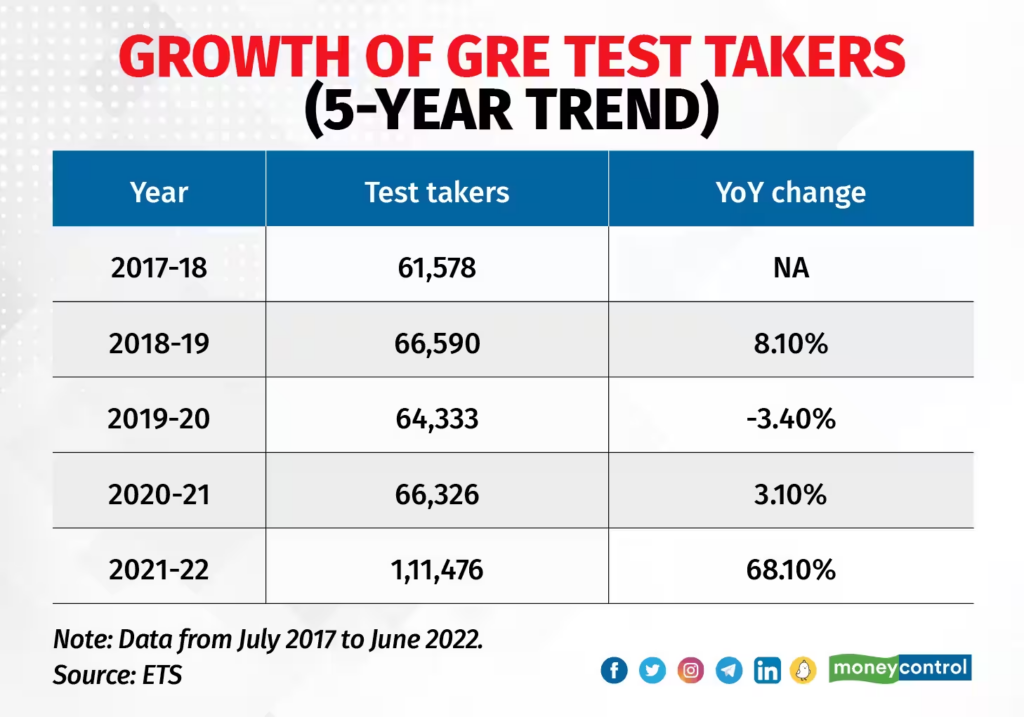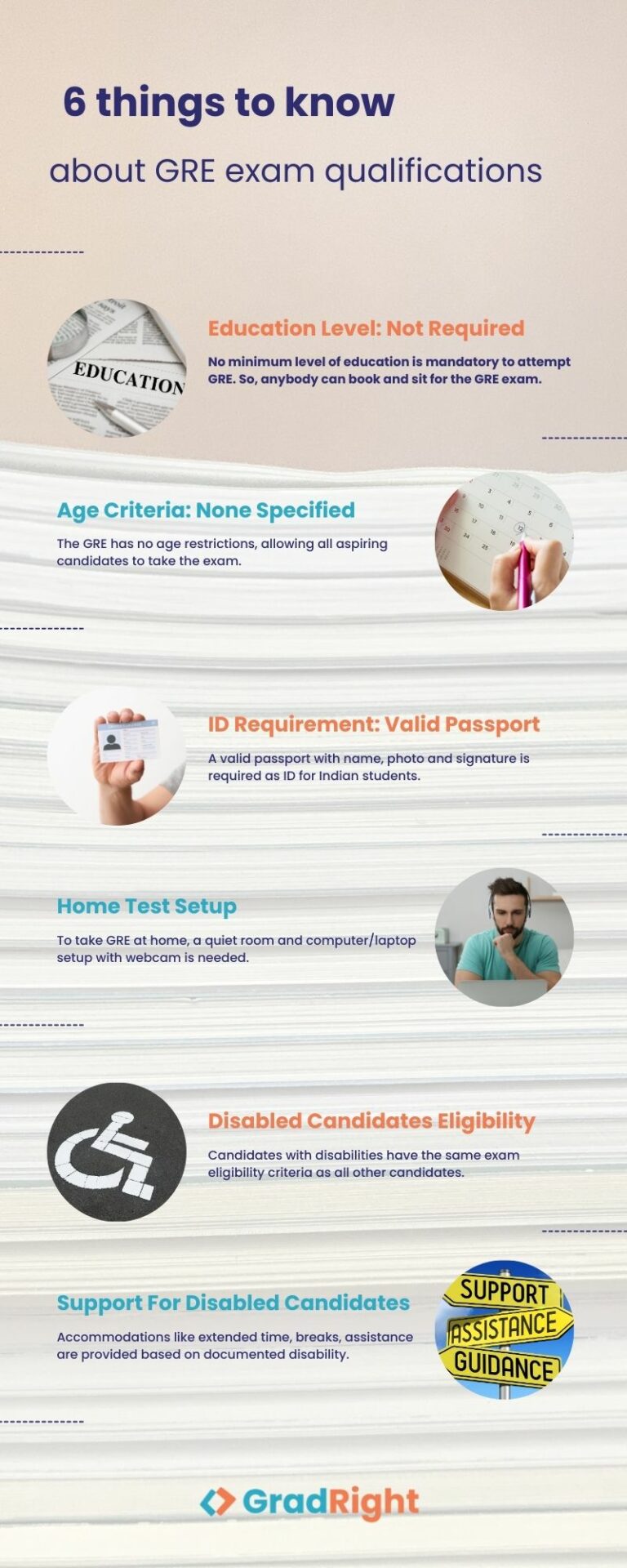The number of Indians attempting the GRE Exam is on an upward trend.

In the 2022-23 testing period, 113,304 Indians attempted the GRE. This was the first time in 80 years that the number of Indian test-takers exceeded that of the US.
But there’s still a lot of confusion around the GRE and who is eligible for it, along with concerns around GRE Exam eligibility for Indian students.
What is the GRE exam?
The Graduate Record Examination, generally called GRE, serves as a standardised admissions test.
Some key facts about the GRE include:
- GRE scores are used for admission into Master’s programs or doctoral degrees
- The test is developed and administered by the Educational Testing Service (ETS)
- It measures verbal reasoning, quantitative reasoning, critical thinking, and analytical writing skills
A lot of Indian colleges have started accepting GRE scores for admission now. However, most applicants attempt the GRE in the hopes of securing a seat at a foreign university. The scores, along with other factors, are used as qualifying criteria for more than 1300 B-Schools across the globe. Many other specialized tech, law, and medical schools also accept GRE scores. Once you ensure exam eligibility and get your scores, it also becomes easier to apply for an educational loan.
Resource: You can use the GradRight Education Loan Eligibility Calculator to find out your study abroad loan eligibility. GRE scores also affect scholarship eligibility. The better your score is, the higher will be your scholarship eligibility.
Subject Tests: Other than the General Test, Subject Tests are also available. These are achievement tests that measure a test-taker’s knowledge and skill level in a specific field of study. Subject Tests are available for the following fields:
- Mathematics
- Physics
- Psychology
The Chemistry Test was discontinued after April 2023. However, scores on the Chemistry Test will continue to remain valid for 5 years after the test date.
Also Read: Top Exams For Studying Abroad [Comprehensive Guide]
GRE Eligibility Criteria – who is eligible for GRE ?
Educational qualification required for GRE . Contrary to common belief, the GRE has no minimum educational qualification for exam eligibility, nor does it set eligibility criteria specifically for engineers. Furthermore, it imposes no age restrictions, making it accessible to all aspiring participants.
Note: Eligibility of exam doesn’t guarantee admission to your preferred universities abroad. Exam eligibility only lets you know whether you can attempt the GRE or not. Universities have their own score cutoffs and other educational requirements.
Also Read: How To Prepare For GRE in 2024 (Complete Strategy)
Documents required for GRE
Till April 15, 2023, an Aadhaar Card could be used as an identification document for applicants in India. But now, a valid passport with your name, photograph, and signature is important to confirm GRE eligibility for Indian students.
Here are key points to consider regarding the document to secure your eligibility for taking the exam:
- Use the original hard copy document; photocopies or electronic displays are not accepted
- First and last names must match your test registration
- The document should include a recent, clear photograph along with your signature
- The ID should be currently valid; expired documents won’t be accepted
The eligibility for Indian students for Subject Tests is the same as that of the General Test.
What is the eligibility to take the exam at home?
The At Home eligibility is generally the same as the eligibility criteria for attempting the test at a center. There is no age limit or specific educational qualification required.
However, you’ll need some special arrangements to ensure eligibility for the exam. These include:
- A quiet room with a tabletop setup
- A desktop or laptop
- An operating system (Windows 10 or macOS X 10.13 or newer)
- An ETS secure web browser for Windows or Mac
- A built-in or external webcam
- A built-in or external microphone
- A valid government-issued ID ready to show to the proctor during the test
You can learn more about the test-day preparations, requirements and tips for At Home here.
Also Read: GRE Exam Syllabus (Section-wise) in 2024: Latest & Updated
What is eligibility for disabled candidates?
ETS (Educational Testing Service), the authority that conducts GRE , is dedicated to ensuring equal access for all candidates. This means candidates with disabilities or health-related needs also have the same exam eligibility as regular candidates.
There are no special (or subsidised) eligibility criteria for disabled candidates. However, disability accommodations are available based on the individual’s documented disability or health-related condition.
Accommodations for disabled test takers include:
- Extended testing time (25%, 50% or 100%)
- Extra breaks
- Assistance; such as human readers or scribes
- Alternative test formats like braille or large-print materials
- Assistance for computer-delivered tests; such as screen magnification or ergonomic keyboards
To avail of these accommodations, a request has to be submitted to the ETS. More details about what documents are required for disability accommodations and what forms/requests need to be submitted can be found here.
Important: The review process (for disability accommodation) typically takes around 6 weeks. Accordingly, candidates should submit their requests as early as possible. Upon approval of accommodations, candidates will receive instructions via email on how to register for the test.
Now that we have understood the eligibility criteria, let’s see how you can prepare for the GRE.

How to prepare for the exam?
The GRE is considered a highly competitive exam, often requiring expert guidance and support for effective preparation. After familiarizing yourself with the eligibility criteria for Indian students, it’s time to get started on your preparation journey.
Here are some tips to help you prepare:
- Familiarise yourself with the format of the exam. Get an idea about the sections (Verbal Reasoning, Quantitative Reasoning, Analytical Writing), question types, and time limit for each section.
? Check out the Test Structure.
- Invest in prep books, online resources or prep courses. These materials typically include practice questions, sample tests, and study guides to help you review the content.
? Register for a FREE virtual event with experts, organised by ETS.
- Develop a study schedule that fits your needs and allows enough time to review all sections of the exam.
- Dedicate time to answering practice questions, taking simulated exams, and reviewing your performance. This also helps perfect your time management skills.
? Free sample questions for Verbal Reasoning
?Free sample questions for Quantitative Reasoning
?Free sample questions for Analytical Writing
Also Read: How To Prepare For GRE in 2024 (Complete Strategy)
Frequently Asked Questions
1. What is the minimum passing score in the GRE?
Just like there is no specific condition for exam eligibility, there is no minimum passing score for the GRE. However, each university or program sets its own score requirements for admission. Check the exam eligibility criteria mentioned on your preferred university’s website to understand how much you need to score to be eligible for admission.
2. How many attempts are there for the GRE?
You can attempt the GRE 5 times within 365 days.
3. What is the time gap between attempts?
There is a 21-day waiting period between attempts. Even if you cancel your scores, the tests still count toward the 5-test limit. However, missed or canceled test appointments are not counted.
4. What is the fee for the GRE in India?
The General Test costs ₹22,550 in India. The Subject Test for testing skills in specific subjects costs ₹14,500.
5. When should Indian students take the GRE?
For Indian students, the best time to take the GRE is at least 6-12 months before the intended program’s application deadline. This means if you are planning to study abroad after your graduation, you should attempt the GRE in your penultimate (2nd) year of college.
This allows ample time for assessing exam eligibility, preparation, retakes (if required) and submitting your scores with the application.


















